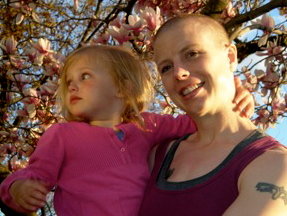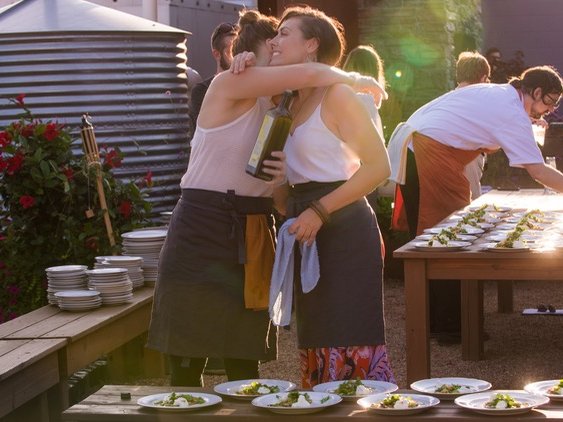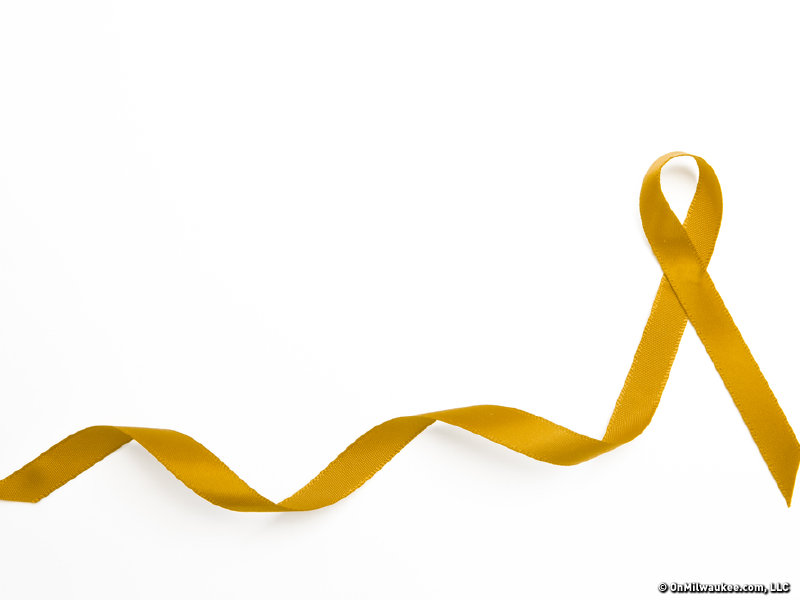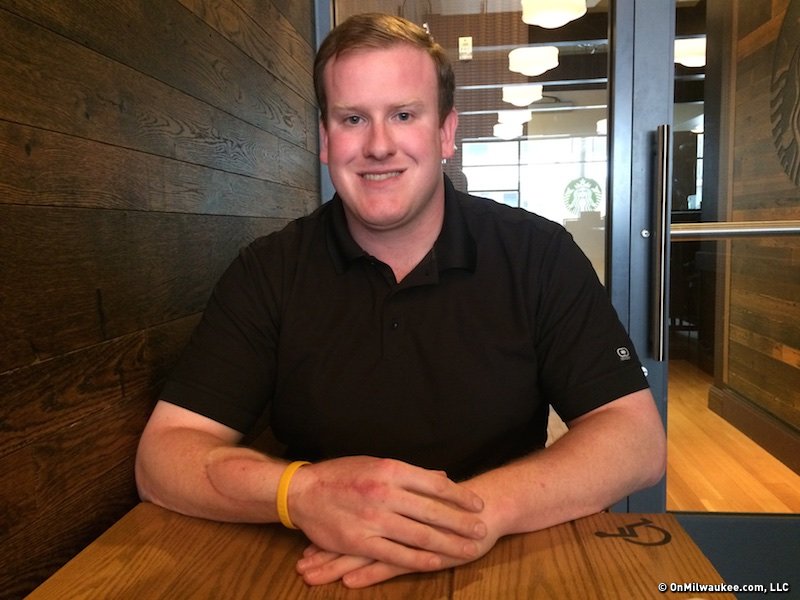Like most moms, Laura Stratte has a lot on her plate. She has a husband, two small children and she recently completed nursing school. However, on top of it all, Stratte, who is 36, was diagnosed with breast cancer.
Stratte underwent a mastectomy in July of 2008, but because of the high reoccurrence rate with her type of cancer, she opted to have chemotherapy to ensure her health. Stratte started chemo in April and is halfway through her six treatments.
As a self-described pessimist of the past, Stratte says getting cancer, albeit frightening and frustrating at times, has changed her perspective and her outlook for the better. She says cancer helped her to have a clearer understanding of what she wanted from her nursing career, encouraged her to eat and live healthier and, most of all, to appreciate her friends, family and community.
"The outpouring of support from others has been incredible," says Stratte. "I still get misty eyed when I think of everyone who has expressed support, made a meal or wrote to me. I have never felt so loved in my life as when I’ve had to deal with cancer."
Recently, OnMilwaukee.com chatted with Stratte to hear what it's like to talk to kids about cancer, undergo chemotherapy and remain optimistic.
OnMilwaukee.com: When and how were you diagnosed with cancer?
Laura Stratte: My symptoms started in January 2008 with some vague right breast pain. I was still nursing my daughter and when I went to my regular doctor, the clinical breast exam was normal, and she chalked it up to hormonal pain, which is quite common. It didn’t go away, so she ordered an ultrasound. A mammogram wasn’t an option because I was still nursing, and the ultrasound was clean. However, the pain persisted and I was becoming more and more concerned.
At the end of March, my right axillary lymph nodes swelled up -- which is not normal -- and my doctor referred me to a breast surgeon. Both said the same thing, there was nothing wrong, the lymph node was "reactive" probably due to nursing and whenever I decided to finish nursing my daughter, I could wait two months and get a baseline mammogram.
I stopped nursing my daughter and finally, the time came for my mammogram. My radiologist saw something suspicious on the imaging. He was almost convinced it was nothing, but said he couldn’t be positive without a biopsy. So two days later, I had a biopsy and on a Saturday morning, June 20, 2008, I got a call from him at home with my cancer diagnosis. Nothing was large enough to be palpated, so without the mammogram, this would have never been found at this early stage.
OMC: When did you have surgery and what was the procedure?
LS: I had a unilateral right mastectomy with sentinel node biopsy on July 14, 2008, at Columbia with immediate reconstruction with a saline implant. In retrospect, I really wish that I had had a bilateral mastectomy. Although research shows it does not increase survival time, having my left breast in place is a source of anxiety and I do hope to one day have another mastectomy.
OMC: When you first found out you had cancer, what did you think? How did you feel?
LS: To be honest, when I first found out I had cancer, I wanted to scream, "I f-ing told you so!" because since January, I had been thinking that something was amiss and felt that no one had listened to me. But after that, I was just like, "Holy sh-t." Then, things just went into high gear and you just do what you have to do to get through. The nurses at Columbia, my cancer navigators, were amazing and held my hand through every single step of the way.
I’m very organized, so about an hour after I got the call from my doctor, I created my cancer binder and made sections for imagining, procedures, test results, etc. That was my way of saying, "OK, this is happening, I have to deal with this and I’m going to get through." I knew I had a ton of support and I knew that I just had no other choice but to get through it, especially since I had children, but to deal. There was no room for melting down, it simply wasn’t an option.
OMC: You opted for chemo not because the cancer came back, but as a proactive measure, right?
LS: Although my tumor was super small ... my tumor has an over-expression of a specific gene that makes it a bit more aggressive and more likely to recur. I felt that I needed to do everything I possibly could to reduce my risk. In addition to diet changes and tamoxifen, chemo was on that list and I couldn’t refuse.
So my chemo, which started on April 24, consists of six rounds every three weeks.
OMC: What is it like to get chemo?
LS: The day of chemo is actually very relaxing. My infusions take about three hours from start to finish and I get them at St Mary’s Milwaukee, at their new cancer center with a view overlooking Lake Michigan. There are TVs with cable and DVD players, so I am well entertained. For my infusion on Monday, I watched "Twilight."
For me, the fatigue and feeling out-of-sorts doesn’t really kick in until the day after chemo and it peaks about two or three days after, then it subsides and I start to feel normal again. The nausea peaks and wanes. The second round sucked but they changed my anitemetics for this third round so it’s going a bit better.
OMC: How old are your kids? How are they responding to your cancer / chemo?
LS: Ned is 6, Freya is 3. Since the beginning, we’ve been really open about cancer and what it means. They are resilient and I think because we are being so open about it all, they don’t seem to be freaking out.
Last summer, for my surgery, they just knew that I had an "owie" on my boob and I couldn’t lift anything with that arm for a few weeks and I had to rest for a while. It wasn’t that big of a deal.
LS: When I first told them, Ned was concerned that others might look at me funny or laugh. So we talked about how people should act if they see someone different -- just act normal -- and how that if someone does laugh, all we need to do is ignore them. Then we talked about all the benefits of being bald like not having to wash or comb your hair, which Ned isn’t too fond of, and I don’t have to worry about how my hair looks, and I get to wear cool hats.
I asked Ned if he wanted me to talk to his K5 class at school, and he was interested in that. His teacher was all for it so, one day, after my head was shaved, I went in and talked to his classmates about cancer, chemo, losing hair and how to treat others who might look different. It was really fun and I could tell that Ned really felt good about it.
OMC: Why did you shave your head before receiving chemo?
LS: I didn’t want to live through the experience of brushing my hair and having a big clump fall out. That doesn’t not seem like fun! Plus, I wanted to impress upon my kids that it wasn’t scary or weird, that it was just a part of the whole chemo package and we had to make it work.
OMC: So, what's it like being bald?
LS: Being bald is actually not so bad. The only real down side is the cold part – which has been an issue this spring! But otherwise, it’s kind of liberating. I don’t have to style my hair in the morning or think about it at all during the day – it’s just one less thing I have to concern myself with. At first I wore hats all the time, but then I got over my self-consciousness quite fast and now I rarely wear hats and have learned to totally ignore any stares. That in and of itself is empowering, because I get to walk around thinking that if I can walk to the grocery store as a bald woman, I can do anything!
OMC: How is your husband handling this?
LS: Jim has been great. He’s given me space, support, taken over the kids when I needed to lie down, etc. Jim can compartmentalize quite well, which probably comes in handy in times like these, and he’s always been able to maintain a stability about him, which has been a great help to me and helped me keep an even keel.
OMC: Are you feeling optimistic? How do you handle the tough days?
LS: I am feeling very optimistic. My fear of recurrence, which was so strong and intense last fall, has faded significantly over time, as everyone said it would. But I do still get scared. I do have days, like today when I feel like I’ve been bulldozed, where it’s hard to keep things in perspective.
My cancer experience could have been a million times worse than it has been and I fully appreciate that! I tend to be pessimistic, but in this experience, I’m really learning how destructive that tendency can be. I’ve really learned to look at the bright side of things and that no matter how crappy things can get, there is always something to be thankful for, and that’s what you need to focus on.
OMC: Did you seek mental health assistance?
LS: Last August, after I had recovered from my mastectomy and gotten a clean bill of health, the whole having-cancer-thing really sunk in and I was having a really hard time dealing with everything that had happened. It was almost like PTSD, I think. I ended up seeing a clinical health psychologist who only works with cancer patients and families of cancer patients. I met with him for a couple of months and he was amazing. He really helped me put things in perspective, work through my emotions, process all the issues I had with being a cancer survivor, living with my "new normal" and just learning to live with fear of recurrence, which is a huge stressor.
I also got a mentor through ABCD (After Breast Cancer Diagnosis), a program that hooks up breast cancer survivors with those newly diagnosed.
OMC: You just graduated from nursing school, right?
LS: I did just graduate in mid-May from Cardinal Stritch and I passed my boards last week. I am officially an RN! My next step is to look for a job and I plan on starting in fall, after chemo is finished. I want to go into oncology nursing. I’d love to become a cancer navigator and help people negotiate cancer treatments.
I was kind of unclear as to what type of nursing I was interested in before my diagnosis, so again, here’s a good thing that has come out of my cancer. I’ve tried to approach my whole experience like a classroom. If I have to have cancer, I may as well learn all I can from the health care providers who are working on me.
Molly Snyder started writing and publishing her work at the age 10, when her community newspaper printed her poem, "The Unicorn.” Since then, she's expanded beyond the subject of mythical creatures and written in many different mediums but, nearest and dearest to her heart, thousands of articles for OnMilwaukee.
Molly is a regular contributor to FOX6 News and numerous radio stations as well as the co-host of "Dandelions: A Podcast For Women.” She's received five Milwaukee Press Club Awards, served as the Pfister Narrator and is the Wisconsin State Fair’s Celebrity Cream Puff Eating Champion of 2019.







